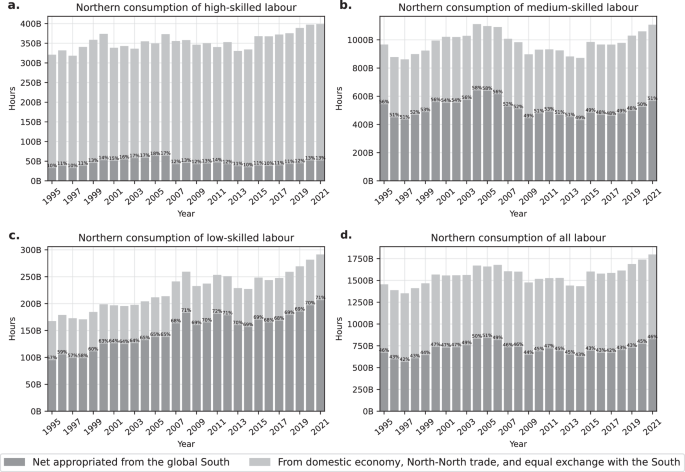Especially in the modern context in the year of our lord 2024. Is it relevant? What do I need to know about it ?
EDIT : Thanks everyone for this really informative thread.
People saying doctors, lawyers, and software engineers are wrong.
The labor aristocracy is essentially the majority of the proletariat in the West. They add very little value to a commodity relative to their wage. Most value is added in the periphery where they extract raw resources from the earth and process it. The labor aristocracy benefits from the exploitation of the laborers in the periphery. If the miners in Congo collected the full value of their labor, the proletariat in the West would lose massively as the cost of their commodities would go up at retail AND their would be very little added value left to justify their salaries.
It's relevant because despite your ideology driving your solidarity with laborers in the periphery, your material conditions world get substantially worse if those laborers had a communist revolution and captured the full value of their labor. That is a major problem for leftists in the imperial core to wrestle with and solve.
I just want to add onto your comment this graph which is also very relevant. from https://lemmygrad.ml/post/5477115
Show
The reddit thread in reaction to that data was hilarious, the amount of cope..
How dare you suggest that I, the prestigious software developer, am not is the backbone of society?
This is a better graph from the same paper
Show
https://www.nature.com/articles/s41467-024-49687-y#MOESM1
While this is true in the USA and marginally true in some other countries, running the actual numbers show only a small drop in material resources for the median resident, and sometimes an increase.
It's really only the USA that's doing truly extensive looting and redistribution to their workers, which leads to the revelation that countries like France don't even benefit from their regional hegemonies, it all goes to the rich.
I think you're missing the strength of the social welfare systems created in Europe and Scandinavia. That constitutes a substantial portion of distribution to the masses beyond salaries. In the USA salaries are huge but there's little social safety net, so even though the USA is doing most of the looting, it has way more poverty. European hegemonies are used to prop up the social democracies that were created to appease workers and prevent a communist revolution. As Europeans lose their social welfare, the only thing that's going to prevent a communist revolution is convincing the workers to fight another world war against other workers.
Amusingly, I noted that the standard welfare recipient in Australia was within 20%of the median world income (at least when I checked)
Roads. Cars. Fuels.
No other nation on the planet lives like we do in the USA. Just imagine gas at $8/gallon. Imagine ALL of the road maintenance, the machines required, the materials required.
Then understand the impact transport has on food distribution in the USA.
Then realize that 46M people in the USA, so about 20%, live with water insecurity. American shoppers spend almost $50Bn on bottled water annually.
Yeah, it's going to be incredibly ugly. Right now, climate change is the biggest threat to the American Southwest. But if the world shut America out of primary economic dominance, cities in Arizona would be abandoned within a few years as no one would be able to secure sufficient water to live there. The climate refugee crisis is going to crush America even if it remains the global hegemon, but if it doesn't and the labor of the global south ends the "free ride", it's going to be horrible for the average American.
Think about those people in Tuscon. Where are they going to go and how are they going to get there? Vehicles. Roads. Gas.
And that doesn't even get into cell phones, computers, industrial equipment, medical equipment, plastics, clothing, SHOES.
It's not that Americans aren't struggling. It's that we're living in an incredibly inefficient setup. And that wording is HILARIOUSLY understating it.
Yeah that "being dragged down to equal" is sort of a fantasy trope related to the whole "civilized" vs "uncivilized" framing. The reality is that the USA is built on unsustainable imperial largesse at industrial scale.
US road expenditure is estimated to be about $250 billion a year.
Many places have gas at similar prices to the US (largely due to taxes, not imperialism).
While new vehicles are a huge resources suck (15 million new vehicles a year), it's only about five to ten percent of GDP and would naturally dwindle in response to declining conditions.
On water insecurity, in 2014 Algeria opened a desalination plant for $500 million. It produces about 500 megalitres a day - so you would need three of them to give those 50 million Americans 150 litres (40 gallons) a day, assuming they were all in one place.
Arizona has more than enough water - 8.5 million megalitres in 2017, of which 72 percent went to agriculture.
But let's say you had to move them because US land use and infrastructure is legitimately the worst - you could stick them in an area the size of Slovenia, assuming the density of the Netherlands, on the west coast here:
Show
I think that's the real problem for the US - it's a naturally rich place but the infrastructure and planning is completely broken. Take healthcare, one of the largest single sectors, gobbling up 20 percent of GDP to deliver generally worse outcomes at twice the cost as other western countries.
All basically fixable with a command economy and average resourcing.
Surely even Americans would revolt if the lack of imperial profits heightens contradictions as capitalists intensity domestic profit extraction when the US hegemon is dead.
Surely even Americans would revolt
I like your post but no, they wouldn’t. It is not a matter of simple disillusionment, for USians it’s practically faith. I can’t overstate this. They will kill everyone “lesser” than them before they go after anyone above them, because no one is above them. I don’t believe any revolution will happen here that isn’t purely aimed downward.
Agree, the labor aristocracy in the west has their material interested intertwined with imperialism and stands to lose from revolution in the periphery. Now just add to the picture: if all the countries, including the west, had communist revolutions, including redistribution, average people in some imperial core countries like the US and Germany would still initially be better of. People in Canada, France and Spain would lose wealth. They would only get freedom, security, peace, fullfilment from end of alienation and survival of the planetary ecosystem, but this is all less immediate and less material.
Show
This is from 2019. As global inequality increases, more and more workers might stand to win wealth from revolution.
Disclaimer: this simple calculation doesn't take into account, how supply chains would shift after revolutions. It basically just looks at the immediate effect of a hypothetical redistribution of wealth. The real impact of global revolutions on workers in the imperial core, as well as the periphery would depend on structures of international solidarity forming. Still, a quantitative perspective like this can be helpful.
The problem with wealth redistribution calculations like this is that they import the wild real estate values of the global north, which only investors generally benefit from (and the occasional sexpat selling their house and moving to another country)
Yes, that's true. The calculation includes real estate "value", or rather prices, which are highly distorted and far removed from value based on labor power. But what would a more Marxist analysis look like and what would it's likely outcome be? Complicated concepts like absolute and differential ground rent from Capital volume three get involved, if you really want to do it thoroughly.
I don't think you could do it quantitatively - you can hand wave away rents entirely with the premise of the question (global equal wealth distribution) and just look at labour and global production, but even then you'll run into issues around substitution.
For example, most of the world's cobalt is mined in horrific conditions by poorly paid children in the DRC, but if you were redistributing wealth globally (and therefore stopping kids having to mine coltan for poor wages) the impact on the price of cobalt and electronic goods would be fairly marginal, because capital investment through mechanisation would increase in the DRC, or Australia would go back to being the primary cobalt producer as it was historically.
Yes, for real value, quantitative studies might be impossible.
Rent just means income without work or exchange. If you want to account for real estate, you can't wave rent or ground rent in the Marxist sense, because expected rent during depreciation plays a part in determining the price for things like land, which don't have an inherent value, because no labor is used to produce them.
I was manly interest in the impact on revolutionary potential in the core.
Edit: Oh, sorry, you meant the premise of revolutions, hence no more rent. Yes, of course.
Like, how would the numbers on the map I linked change, if real estate weren't included in the calculation?
your material conditions world get substantially worse is those laborers had a communist revolution and captured the full value of their labor. That is a major problem for leftists in the imperial core to wrestle with and solve.
I think this is unhelpful zero sum thinking, and is driven by looking at nominal prices instead of what the dollars actually buy. Most of the "surplus" labour value is sucked up by capitalists, and most of the rest is sucked up by developers and real estate ponzi schemes.
It's not zero sum. We could be in relations that multiply our effectiveness. We are not. This is real. Those landlords in the imperial core get their money from rent. That rent comes from salaries. Those salaries come from the value of commodities. The majority of the value in those commodities is not created by spreadsheet jockies, cold email biz dev specialists, social media influences, PR firms, marketing agencies, website design consultancies, logo rebranding exercises, corporate event planning, change managers, business analysts, strategy consulting, and thousands of other jobs and activities that dominate the imperial core.
You could reduce the price of housing to its actual cost, but it won't help if you can't get fuel to travel the scores or miles daily that American life requires.
Those landlords in the imperial core get their money from rent. That rent comes from salaries. Those salaries come from the value of commodities.
I am confused - the decline in material conditions for the global north will arise because landlords and capitalists can no longer get the same rents as before?
Of that list of occupations, how many contribute to improving your material conditions? I don't need a reallocation of labour from bullshit jobs to productive and useful work as a decline, and I doubt the normal workers in those professions would either. Historically the global north did a lot of manufacturing (aided by cheap energy and agricultural outputs from the global south - two factors largely solved with appropriate capital allocation).
To invert it, if imperial domination is the only way to sustain an advanced economy, how did China become as advanced as they are today without imperial domination and without 150 years of capital accumulation?
These are rhetorical questions - my view is that any decline in material conditions (beyond a couple of very specific things like coffee or cocoa) will be short lived as the new material conditions will drive political and economic changes.
You said most of the value is extracted by the bourgeoisie. I said that the way they extract it passes through the labor aristocracy. They could extract it without the labor aristocracy but they'd have revolutionary conditions on their hand. So instead they pay salaries from the surplus value generated by the periphery and then reclaim those salaries through rent, taxes, etc.
If the surplus value is retained by the periphery, the salaries cannot be paid from that anymore. That means rent cannot be paid from it, therefore we go through a potentially revolutionary adjustment in cost of living.
The problem is that there's very little surplus value domestically. Yes, historically the USA had industry, but they built it on top of genocide and land theft. Now, though, the USA doesn't make much of anything from raw to finished. Everything that it does make, like food, relies on major inputs from the global south like fertilizer. But more importantly, it relies on massive road infrastructure to maintain it's imperial dominance over the continent. That road infrastructure is highly dependent on global exploitation.
How did China build industry without imperialism? Self-exploitation. It did not retain the surplus value of the labor of its proletariat. It intermediated the flow of value but it did not revolutionize the flow of the value. It attracted capital investment from the global bourgeoisie explicitly by maintaining their ability to profit from exploitation, that is, extracting surplus value from the labor of the Chinese proletariat.
As China increases wages, it is partnering with countries who also have been exploited by the imperialists and it is intermediating that value stream now. This allows the Chinese proletariat to improve their conditions and the Chinese state and Chinese bourgeoisie to allocate capital without triggering destructive reactionary behavior from the global bourgeoisie.
The value streams are remaining mostly intact, the global bourgeoisie is still extracting surplus value through China, and China has not chosen to shutdown the exploitation of its people.
Which brings us back to the North Atlantic labor aristocracy. European society is unsustainable. They devastated their peninsula of Eurasia and had no land left to exploit, so they went to sea. They spread like a cancer all over the planet, but they didn't find anything to replace their land until they arrived at Turtle Island. Once here, the European cancer devastated two entire continents and the people on it. Completely unsustainable, just like Europe, but the land was vast. It's only been 530 years since then. Conditions change. The USA is a completely unsustainable economic system on top of a completely unsustainable settler system on top of a completely unsustainable genocidal system.
If the flow of surplus value were to stop immediately, America would face total catastrophe, and in the face of total catastrophe it would launch a massive war campaign, just like the Euro virus always has when faced with catastrophe. Such a war would be in service of maintaining the flow of surplus value for generations to come by destroying the productive capacity of the rest of the world, forcing them to rely on the imperial bourgeoisie for rebuilding and thus ensuring surplus value is extracted by the imperialists.
What would not happen is sudden domestic investment to build production in the USA and a re- proletarianization of the labor aristocracy. And the reason that wouldn't happen is because the capabilities no longer exist in ready form in the USA and because the native population and the formerly enslaved population will force the issue of liberation, forcing the USA to allocate resources to domestic control and genocide instead of production and reproduction.
Ah, gotcha. I had seen it used both ways, so thank you! Deleted my comment, this one is much better.
Part of the reason there is some confusion is the term pre-dates the Marxist use of the term, which Lenin originated. Just like how imperialism was a term, but Lenin used it to refer to a specific phenomena of capitalism. In fact I think he originates it in Imperialism the Highest Stage of Capitalism (though he might have used it earlier, I can't remember)
The original term in the late 19th century was just used for a well paid worker. This is what a whole heap of non-marxist people still use.
The IWW started using it in the early 20th century specifically to refer to professionals like engineers, doctors, skilled craftsmen, who were insulated from the same conditions as other workers. Who would often have guilds, rather than unions. The IWW specifically being Anarchists, Syndicalists, Marxists, DeLeonists and other various socialists, but not Marxist-Leninists. So you also hear it used in some union contexts still. Not that the IWW really is around in any real numbers, but it sort of spread to less radical unions.
Then Lenin uses the term to apply to all workers in the imperial core as is mentioned in other comments here. Despite myself holding to the Marxist-Leninist position I have basically dropped it from my vocabulary due to the ambiguity. I will say well paid proletariat, or imperial core proletariat etc
It's a pretty nebulous term the roots of which are in Lenin's Imperialism in which he describes a class of workers that sides with imperialists because they receive a portion of the superprofits of imperial exploration.
Historically it was used to describe business union leadership or union workers more broadly, especially those in the war industries. Further left tendencies tend to broaden the scope of who is a labor aristocrat including professional workers or even the whole of the white working class.
Personally I think as Marxists we need to reckon with the fact that many workers in the imperial core have petite-bourgeois brain worms precisely because their minds have been thoroughly rotted by debt and consumerism subsidized by the blood and sweat of the global periphery. That doesn't mean we should eschew work among these workers but we should understand it's limitations.
For instance there's a massive naval shipyard near me that employs many people (mostly cis white dudes). They have a militant union and excellent pay and benefits. Unsurprisingly they're all ridiculously conservative and nationalist and I've had multiple employees there tell me war would be good for them because it would mean more work and better compensation. Just because many of these workers are union proles does not mean that they will easily align with the interest of the global proletariat and if we are organizing or agitating them we need to understand that.
war would be good for them because it would mean more work and better compensation
idk why they think their workplace getting hit with a cruise missile or nuke would be good for them but maybe i'm not smart
People who sell their labor but enjoy elevated privileges compared to less prestigious jobs
For example, a code monkey making $120k a year is a labor aristocrat compared to a deliveryman making $50k a year despite both selling their labor and not owning the means of production.
Those that fall under LA are usually more aligned and/or closer with the bourgeoisie. Think of middle managers who hang out with the CFO and CEO or a lawyer who has to interact with politicians and businessmen. I don’t know if this counts, but there are also service workers who resist minimum wage laws because they make more with tips and don’t want to be restricted with everybody else, so their politics are aligned with the companies.
The difference between LA and petite bourgeoisie is that the latter owns the means of production on a smaller scale and frequently also sell their labor.
Is it relevant? I mean, yeah. A lot of working class people don’t want to be shoving boxes or pumping shit out of toilets for a living if the pay and conditions are terrible. They will either aspire or have their kids aspire to do “better”. Once you reach it, you will probably become more out of touch just by the nature of being separated from the ground. Many industries like STEM are notorious for being anti union. And many unions seek to keep their labor aristocracy status and not exactly have solidarity with all labor. Some theorists propose that western LA will resist any attempts from outside the imperial core to improve its conditions because that would inherently mean living standards in the west lowers as exploitation is evened out. We can see this play out in places like France where it seeks to deploy the military in Niger to secure its uranium after the new government became anti-French, and you don’t see many protests against it despite everyone fetishizing the French’s labor protesting.
Labor Aristocracy - The section of the international working class whose privileged position in lucrative job markets opened up by imperialism guarantees its receipt of wages approaching or exceeding the per capita value created by the working class as a whole. The class interests of the labor aristocracy are bound up with those of the capitalist class, such that if the latter is unable to accumulate superprofits then the super-wages of the labor aristocracy must be reduced.
TL:DR : if you make more than the average ppp-adjusted world wage, then you are in a minority of the world's workers, and part of the labor aristocracy.
Another way of looking at it, would be the house vs the field slaves of a US slave plantation.
The field slaves are the producers of the surplus (via the agricultural commodities they create and are then sold on the market). The house slaves do not produce surplus value, they only produce use values for the masters house, and live off a part of the value created by the field slaves. They aren't part of the ruling slaveocracy, but they live from the same source.








